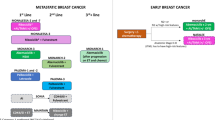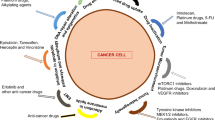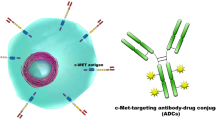Abstract
Background
In recent years, drug resistance has become a most important challenge in chemotherapy of malignancies. Here, we investigated a novel approach to enhance therapeutic potential of doxorubicin (Dox as a common chemotherapeutic drug) by co-administration of apatinib (Apa as a monoclonal antibody) in breast cancer treatment.
Methods and results
Effects of Apa, Dox, and their combinations (Apa-Dox) were investigated on proliferation of MDA-MB-231 breast cancer cells by MTT assay. Moreover, migration and invasion of the treated and untreated control cancer cells were evaluated by scratch and transwell methods, respectively. Apoptosis percentage of the treated cancer cells was investigated by flow cytometry method. Finally, apoptosis-, metastasis-, and angiogenesis-related gene expression at mRNA and protein levels in the cancer cells were investigated by Real-Time PCR and western blotting methods, respectively. Our results indicated that treatments of cancer cells by Apa, Dox, and Apa-Dox significantly decrease proliferation, migration, and invasion of MDA-MB-231 breast cancer cells. Treatments of the breast cancer cells by Apa, Dox, and Apa-Dox significantly increase apoptosis percentage. We observed that anticancer effects of Apa, Dox, and Apa-Dox may due to modification of apoptosis-, metastasis-, and angiogenesis-related gene expression (at mRNA and protein level) in the breast cancer cells. However, anticancer potential of Apa-Dox combination was significantly more than Apa and Dox monotherapy.
Conclusion
We demonstrated that Apa significantly increases anticancer potential of Dox in MDA-MB-231 breast cells. However, further in-vitro, in-vivo, and clinical studies are required to confirm this result.







Similar content being viewed by others
Data Availability
The datasets used and/or analyzed during the current study are available from the corresponding author on reasonable request.
References
Li S, Wang Y, Feng C, Wu G, Ye Y, Tian J (2017) Calycosin inhibits the migration and invasion of human breast cancer cells by down-regulation of Foxp3 expression. Cell Physiol Biochem 44:1775–1844
Mehralizadeh H, Nazari A, Oruji F, Roostaie M, Hosseininozari G, Yazdani O, Esbati R, Roudini K (2023) Cytokine sustained delivery for cancer therapy; special focus on stem cell-and biomaterial-based delivery methods. Pathol-Res Pract 247:154528
Firouzi Amoodizaj F, Baghaeifar S, Taheri E, Farhoudi Sefidan Jadid M, Safi M, Seyyed Sani N, Hajazimian S, Isazadeh A, Shanehbandi D (2020) Enhanced anticancer potency of doxorubicin in combination with Curcumin in gastric adenocarcinoma. J Biochem Mol Toxicol 34:22486
Isazadeh A, Hajazimian S, Shadman B, Safaei S, Bedoustani AB, Chavoshi R, Shanehbandi D, Mashayekhi M, Nahaei M, Baradaran B (2020) Anti-cancer Effects of Probiotic Lactobacillus acidophilus for Colorectal Cancer Cell Line Caco-2 through apoptosis induction. Pharm Sci 27:262–267
Farhoudi Jadid M, Aghaei E, Taheri E, Seyyedsani N, Chavoshi R, Abbasi S, Khorrami A, Goleij P, Hajazimian S, Taefehshokr S, Isazadeh A (2021) Melatonin increases the anticancer potential of doxorubicin in Caco-2 colorectal cancer cells. Environ Toxicol 36:1061–1069
Maroufi NF, Vahedian V, Hemati S, Rashidi MR, Akbarzadeh M, Zahedi M, Pouremamali F, Isazadeh A, Taefehshokr S, Hajazimian S, Seraji N (2020) Targeting cancer stem cells by melatonin: effective therapy for cancer treatment. Pathol Res Pract 216:152919
Yu W-C, Zhang K-Z, Chen S-G, Liu W-F (2018) Efficacy and safety of apatinib in patients with intermediate/advanced hepatocellular carcinoma: a prospective observation study. Medicine 97:e9704
Maroufi NF, Vahedian V, Akbarzadeh M, Mohammadian M, Zahedi M, Isazadeh A, Pouremamali F, Taefehshokr S, Heidari M, Rashidi M, Nouri M (2020) The apatinib inhibits breast cancer cell line MDA-MB-231 in vitro by inducing apoptosis, cell cycle arrest, and regulating nuclear factor-κB (NF-κB) and mitogen-activated protein kinase (MAPK) signaling pathways. Breast Cancer 27(4):613–620
Sadeghi-Aliabadi H, Minaiyan M, Dabestan A (2010) Cytotoxic evaluation of doxorubicin in combination with simvastatin against human cancer cells. Res Pharm Sci 5:127
Shabani S, Moghadam MF, Gargari SL (2021) Isolation and characterization of a novel GRP78-specific single-chain variable fragment (scFv) using ribosome display method. Med Oncol 38(9):115
Hajazimian S, Maleki M, Mehrabad SD, Isazadeh A (2020) Human Wharton’s jelly stem cells inhibit endometriosis through apoptosis induction. Reproduction 159:549–558
Soltanzadeh H, Acik L, Turk M, Houshmand M, Shahsavari G (2018) Antimicrobial, antioxidant, cytotoxic and apoptotic activities of Satureja khuzestanica. Gazi Med J 29(3):264–270
Kaboli PJ, Shabani S, Sharma S, Nasr MP, Yamaguchi H, Hung MC (2022) Shedding light on triple-negative breast cancer with Trop2-targeted antibody-drug conjugates. Am J Cancer Res 12:1671
Taheri E, Ghorbani S, Safi M, Sani NS, Amoodizaj FF, Heidari M, Chavoshi R, Hajazimian S, Isazadeh A, Heidari M (2020) Inhibition of colorectal cancer cell line CaCo-2 by essential oil of eucalyptus camaldulensis through induction of apoptosis. Acta Med Iran 58:260–265
Kozani PS, Shabani S (2021) Adverse events and Side Effects of chimeric Antigen receptor (CAR) T cell therapy in patients with hematologic malignancies. Trends Med Sci 1:e116301
Isazadeh H, Oruji F, Shabani S, Behroozi J, Nasiri H, Isazadeh A, Akbari M (2023) Advances in siRNA delivery approaches in cancer therapy: challenges and opportunities. Mol Biol Rep. :1–5
Hosseinzadeh L, Behravan J, Mosaffa F, Bahrami G, Bahrami AR, Karimi G (2011) Effect of curcumin on doxorubicin-induced cytotoxicity in H9c2 cardiomyoblast cells. Iran J Basic Med Sci 14:49–56
Abbasi S, Bazyar R, Saremi MA, Alishiri G, Seyyedsani N, Jadid MF, Khorrami A, Golmarz PE, Jahangirzadeh G, Bedoustan AB, Hajazimian S (2021) Wharton jelly stem cells inhibits AGS gastric cancer cells through induction of apoptosis and modification of MAPK and NF-κB signaling pathways. Tissue Cell 73:101597
Oruji F, Baghbani Arani F, Mahdavi Ortakand M (2018) Evaluation of the gene expression of IL-1β and Casp-1 related to inflammation process in glomerulonephritis patients. J Anim Environ 10:477–482
Hashemi A, Bigdeli R, Shahnazari M, Oruji F, Fattahi S, Panahnejad E, Ghadri A, Movahedi-Asl E, Mahdavi-Ourtakand M, Asgary V, Baghbani-Arani F (2021) Evaluation of inflammasome activation in peripheral blood mononuclear cells of hemodialysis treated patients with glomerulonephritis. Iran J Pharm Res 20:609
Ghaleh AS, Saghati S, Rahbarghazi R, Hassani A, Kaleybar LS, Geranmayeh MH, Hassanpour M, Rezaie J, Soltanzadeh H (2021) Static and dynamic culture of human endothelial cells encapsulated inside alginate-gelatin microspheres. Microvasc Res 137:104174
Hseu YC, Lin RW, Shen YC, Lin KY, Liao JW, Thiyagarajan V, Yang HL (2020) Flavokawain B and doxorubicin work synergistically to impede the propagation of gastric cancer cells via ROS-mediated apoptosis and autophagy pathways. Cancers 12:2475
Jadid MF, Shademan B, Chavoshi R, Seyyedsani N, Aghaei E, Taheri E, Goleij P, Hajazimian S, Karamad V, Behroozi J, Sabet MN (2021) Enhanced anticancer potency of hydroxytyrosol and curcumin by PLGA-PAA nano‐encapsulation on PANC‐1 pancreatic cancer cell line. Environ Toxicol 36:1043–1051
Fath MK, Naderi M, Hamzavi H, Ganji M, Shabani S, Khalesi B, Pourzardosht N, Hashemi ZS, Khalili S (2022) Molecular Mechanisms and therapeutic effects of different vitamins and minerals in COVID-19 patients. J Trace Elem Med Biol 73:127044
Ahmadi E, Zarghami N, Jafarabadi MA, Alizadeh L, Khojastehfard M, Yamchi MR, Salehi R (2019) Enhanced anticancer potency by combination chemotherapy of HT-29 cells with biodegradable, pH-sensitive nanoparticles for co-delivery of hydroxytyrosol and doxorubicin. J Drug Deliv Sci Technol 51:721–735
Salzillo A, Ragone A, Spina A, Naviglio S, Sapio L (2021) Chlorogenic acid enhances doxorubicin-mediated cytotoxic effect in Osteosarcoma cells. Int J Mol Sci 22:8586
Acknowledgements
This article was adapted from the Ph.D. thesis of Elnaz Aghaei, where Dr. Hossein Soltanzadeh and Dr. Leila Kohan supervised, and Dr. Mohammad Heiat advised this project.
Funding
There is no funding/support.
Author information
Authors and Affiliations
Contributions
EA and HS designed this study, analyzed the data, prepared the figures and wrote original draft. LK and MH oversaw the study and revised the article. All Authors reviewed and approved the article.
Corresponding author
Ethics declarations
Competing interests
All authors declare they have no financial interests.
Ethical approval
This article does not contain any studies with human participants or animals performed by any of the authors.
Additional information
Publisher’s Note
Springer Nature remains neutral with regard to jurisdictional claims in published maps and institutional affiliations.
Rights and permissions
Springer Nature or its licensor (e.g. a society or other partner) holds exclusive rights to this article under a publishing agreement with the author(s) or other rightsholder(s); author self-archiving of the accepted manuscript version of this article is solely governed by the terms of such publishing agreement and applicable law.
About this article
Cite this article
Aghaei, E., Soltanzadeh, H., Kohan, L. et al. Apatinib increases anticancer potential of doxorubicin in breast cancer cells. Mol Biol Rep 50, 10137–10145 (2023). https://doi.org/10.1007/s11033-023-08860-0
Received:
Accepted:
Published:
Issue Date:
DOI: https://doi.org/10.1007/s11033-023-08860-0




